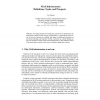160 search results - page 31 / 32 » Dynamics and control in component-based agent models |
ATAL
2007
Springer
14 years 1 months ago
2007
Springer
Reinforcement learning promises a generic method for adapting agents to arbitrary tasks in arbitrary stochastic environments, but applying it to new real-world problems remains di...
AGENTS
2000
Springer
13 years 12 months ago
2000
Springer
This paper attempts to articulate the general role of infrastructure for multi-agent systems (MAS), and why infrastructure is a particularly critical issue if we are to increase th...
IEEESCC
2006
IEEE
14 years 1 months ago
2006
IEEE
Service composition aims to provide an efficient and accurate model of a service, based on which the global service oriented architecture (SOA) can be realized, allowing value add...
EUROPAR
2003
Springer
14 years 23 days ago
2003
Springer
Efficient discovery and resource allocation is one of the challenges of current Peer-to-Peer systems. In centralized approaches, the user requests can be matched to the fastest, ch...
ICML
1994
IEEE
13 years 11 months ago
1994
IEEE
Compositional Q-Learning (CQ-L) (Singh 1992) is a modular approach to learning to performcomposite tasks made up of several elemental tasks by reinforcement learning. Skills acqui...

